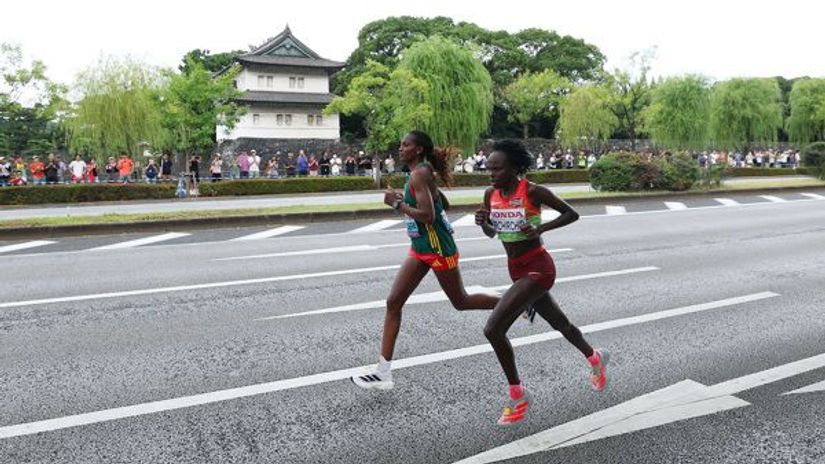A roar that replaced the silence
The last time the Olympic Stadium in Tokyo staged global competition, it was held behind closed doors. Beatrice Chebet watched those Games from afar, a rising talent still waiting for a senior international debut. Now 25, she stepped onto that same track and delivered a performance that married relief with history, ending Kenya’s decade-long wait for women’s 10,000m gold.
Her run was a reaffirmation of presence as much as pace. For years, Ethiopia had gripped the longest track distance, even sweeping the podium in Budapest two seasons ago. Chebet cut through that narrative with authority, and with a finish that sent a shockwave through the closing lap.
| CASINO | BONUS | INFO | RATING | |
|---|---|---|---|---|
|
bonus
Deposit KES 147 for up to KES 14,745 bonus + spins!
See 10 Bonuses
|
info
BK 0000683 Industry-leading software providers, over 30 casino games, BCLB license |
|||
|
bonus
Register for up to 31,400 KSH bonus on deposits!
See 12 Bonuses
|
info
No. ALSI-112310012-F15 Unique selection of slots & games |
|||
|
bonus
New players get 50 free spins and a Ksh 2500 freebet!
See 7 Bonuses
|
info
BK 0000665 PG 0000405 Good combination of online casino and betting platform |
Chebet ends a decade long wait in a final lap to remember
Chebet timed her sprint to perfection and stopped the clock at 30:37.61, edging Italy’s Nadia Battocletti, who claimed silver in a national record of 30:38.23, with defending champion Gudaf Tsegay taking bronze in 30:39.65. Kenya’s Agnes Jebet Ngetich fought bravely for fourth in 30:42.66, a testament to a race shaped by patience, teamwork, and nerve.
It was Kenya’s first women’s 10,000m world title since Vivian Cheruiyot in 2015, a span that makes this victory feel both overdue and timely. Chebet has built towards this moment with an upward arc, already a World Cross Country champion and an Olympic champion, and now the crown fits at the World Championships too.
“Ten years later? I didn’t know that,” Chebet said with a smile. “Coming to Tokyo, I told myself, ‘Beatrice, you have to go for it.’ I didn’t have a World Champs gold, and now I do. I’ve won cross-country, I’m an Olympic champion, and now I’m a world champ. I’m so happy for myself.”
Chebet’s gratitude flowed as freely as her kick. She thanked her coach, her family, Athletics Kenya, the Ministry, and fans back home, a reminder that the medal draped around her shoulders carries the fingerprints of a support system built over years. It also carries the weight of a rivalry rekindled, since Ethiopia’s challenge was stern and unyielding deep into the final lap.
The double on her mind and the friend in her lane
There is little time to bask when ambition is this big. Chebet pivots to the 5000m, where only Tirunesh Dibaba in 2005 and Vivian Cheruiyot in 2011 have completed a 10,000m and 5000m double at a single World Championships. The path to that club runs through a familiar face, her close friend and training partner Faith Kipyegon, a triple Olympic 1500m champion.
“It will not be an easy race,” Chebet said of the 5000m. “You have to be strong mentally, physically, everything. My target is to be on the podium and hopefully with gold again.”
Chebet described how the Kenyans assisted each other during the 10,000m, including with Agnes Jebet Ngetich, and how the celebration is shared no matter who breaks the tape. That blend of camaraderie and competitive edge has become a hallmark of Kenya’s distance culture, and in Tokyo it is already paying dividends.
The marathon masterclass that brought Kenya a second gold
In the early hours, as the city stirred, the women’s marathon set off at 1.30 am Kenyan time, and Peres Jepchirchir turned the streets of Tokyo into a lesson in composure. The Olympic champion won in a season’s best 2:24:43, outkicking Ethiopia’s Tigist Assefa in a gripping finish that hinged on the final 200 metres.
Assefa, the reigning Olympic silver medallist, crossed two seconds later in 2:24:45, close enough to taste the tape but not to touch it. Behind them, history took an unexpected route to the podium, as Uruguay’s Julia Paternain secured bronze in 2:27:23, becoming the first Uruguayan athlete ever to medal at a World Championships. She looked so immersed in the effort that she seemed briefly unaware she had finished, a snapshot of the purity of marathon fatigue.
Jepchirchir’s run was as tactical as it was tough. She and Assefa matched each other stride for stride through much of the 42.195 km, trading surges before the race finally cracked inside the National Stadium. Assefa made the first move, Jepchirchir countered with patience, then with 60 metres remaining she uncorked the decisive sprint that has become her signature on the biggest stages.
There were stories within the story. American Susanna Sullivan led solo for more than 10 miles, bold enough to test the field, and held on for fourth after the pack swept her up. Kenya’s Jackline Cherono finished 18th in 2:33:17, while Magdalyne Masai stepped off at around 35 km. Every marathon writes its own ledger of risk and reward, and this one brimmed with both.
Legacy confirmed and a crown reclaimed
Jepchirchir is building one of the great résumés in road running. Between 2021 and 2022 she became the only athlete to win the Olympic, Boston, and New York City marathons in an eight month span, a sequence that demands versatility and fearlessness. She added the London Marathon title in 2024 with a women’s only world record, and in 2025 Tigist Assefa responded by reclaiming that world record during her London win, setting up their Tokyo duel with extra edge.
In Tokyo, the edge belonged to Jepchirchir. Her victory delivered Kenya’s second gold of the championships following Chebet’s 10,000m triumph, and ensured the marathon crown returned to Kenya from Ethiopia. More than medals, it was a statement that Kenya’s women, on track and road alike, remain standard setters when the stakes are highest.
Teamwork, timing and Tokyo’s test
These championships are as much about preparation as performance. Anticipating heat, World Athletics moved the marathon start 30 minutes earlier to mitigate conditions, another reminder that strategy begins long before the starter’s pistol. Jepchirchir spoke repeatedly about the power of the collective in such circumstances, a mindset that steadies a team when the variables stack up.
“We should stick together and fight as a team,” she said before race day. “We are well prepared, and everybody in the team is in high spirits and is hoping for the best.”
Her words resonated in the result. The tactics were measured, the response to surges calculated, and the final move kept in reserve for the moment it would count most. In championship marathons, where pacemakers are absent and positioning is everything, that blend of patience and punch becomes the difference between podiums and near misses.
Why these wins matter for Kenya and for the sport
Chebet’s victory reset a balance that had tilted away from Kenya in the women’s 10,000m. It acknowledged the strength of Ethiopia’s tradition in the event, then pushed back with a flourish that was both tactical and emotional. The fact that Nadia Battocletti set an Italian record while pushing Chebet to the line underscores the rising standard across Europe and Africa alike.
Jepchirchir’s win, meanwhile, threads Tokyo into a personal tapestry that already includes Olympic gold in Sapporo. Her season’s best arrived not in the windless comfort of a paced major, but in the hard school of championship racing, where patience is currency and courage is interest. Together, these golds animate Kenya’s campaign and elevate the championships narrative with performances that were both thrilling and exact.
What comes next on the track
All eyes will turn to the 5000m, where Chebet aims to chase a historic double. Only two women have managed that feat at a single World Championships, and standing across the line could be her friend and sometime partner in pace, Faith Kipyegon. Chebet’s approach is grounded in calm, competition wrapped in camaraderie, the kind of mindset that keeps legs loose and minds light when pressure is loud.
Whatever the 5000m brings, the tone has been set. The opening weekend gave Kenya authority and momentum, and gave Tokyo the kind of sound that erases the silence of 2021. The city that once echoed with absence is now humming with achievement, and Kenya is at its center.
Key results at a glance
- Women’s 10,000m, Beatrice Chebet 30:37.61, Nadia Battocletti 30:38.23 national record, Gudaf Tsegay 30:39.65,
- Women’s marathon, Peres Jepchirchir 2:24:43 season’s best, Tigist Assefa 2:24:45, Julia Paternain 2:27:23 first World Championships medal for Uruguay,
- Notables, Agnes Jebet Ngetich fourth in 10,000m 30:42.66, Susanna Sullivan fourth in marathon after a long solo lead, Jackline Cherono 18th 2:33:17, Magdalyne Masai did not finish.
The human pulse behind the medals
What lingers after the clock stops is the human part. Chebet’s smile when she learned she had ended a ten year wait, the way she spoke about family and federation, the nod to teammates who shared the pace when it mattered. Those details are the quiet pillars beneath the loudest moments, and they give performances their shape long after the applause fades.
Jepchirchir’s sprint to gold was the final line of a carefully written race, a closing kick earned by years of repetition and the kind of resilience that once helped her conquer Sapporo’s heat. Finishing with joy, and with just enough distance to breathe before the line, she reminded us that champions learn when to wait and when to fly.
Tokyo has seen both now, and Kenya has reminded the world what it looks like when timing, teamwork, and talent meet the moment. As the championships roll on, one thing already feels certain, the stories of this week will be replayed, retold and remembered, because they carried more than medals, they carried meaning.









